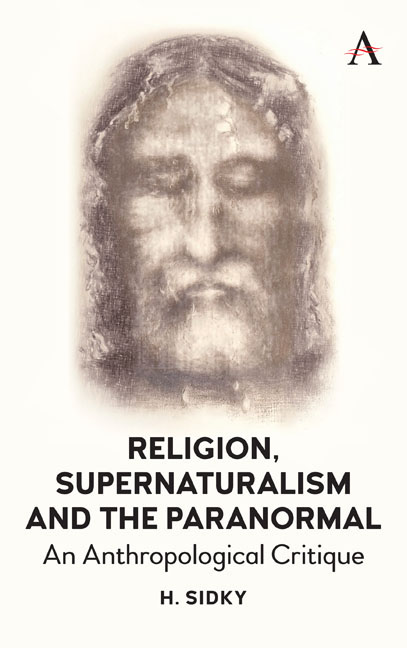Book contents
- Frontmatter
- Dedication
- Contents
- Acknowledgments
- Introduction
- Chapter One The Problem with Religion: Preliminary Issues
- Chapter Two The Unreal Real: The Supernatural, Religion, and the Paranormal
- Chapter Three Can Science Say Anything About Religion and the Supernatural?
- Chapter Four Ghostly Rappings, the Science of the Soul, and the Religious Nature of the Paranormal
- Chapter Five Ghostly Encounters in the Field: Anthropology of the Paranormal or Paranormal Anthropology?
- Chapter Six Why We Think the World Is Haunted
- Chapter Seven Cognitive Biases and Why People Think Eerie Thoughts
- Chapter Eight Miracles as Evidence of God's Actions in the World
- Chapter Nine When God Talks to People: Are Religious Experience Evidence of God?
- Chapter Ten Books Authored by God? Sacred Texts as Evidence of the Supernatural
- Chapter Eleven God's Fingerprints in the Natural World: Intelligent Design, Irreducible Complexity, and Cosmic Fine-Tuning
- Chapter Twelve The Miracles of the Bible: The Quintessential Foundations of Paranormal Beliefs in Western Culture
- Chapter Thirteen Jesus the Miracle Worker, Magician, and Sorcerer
- Chapter Fourteen Jesus's Empty Tomb, Missing Body, and Return from The Dead: Sources for the Paranormal Tale
- Chapter Fifteen The Post-Resurrection Appearances in the New Testament
- Chapter Sixteen Coping with Failed Prophesy: A Socio-Psychological Explanation for the Rise of Christianity
- Chapter Seventeen Conclusions: Why Religious and Paranormal Beliefs Persist and Their Dangers
- References
- Index
- Frontmatter
- Dedication
- Contents
- Acknowledgments
- Introduction
- Chapter One The Problem with Religion: Preliminary Issues
- Chapter Two The Unreal Real: The Supernatural, Religion, and the Paranormal
- Chapter Three Can Science Say Anything About Religion and the Supernatural?
- Chapter Four Ghostly Rappings, the Science of the Soul, and the Religious Nature of the Paranormal
- Chapter Five Ghostly Encounters in the Field: Anthropology of the Paranormal or Paranormal Anthropology?
- Chapter Six Why We Think the World Is Haunted
- Chapter Seven Cognitive Biases and Why People Think Eerie Thoughts
- Chapter Eight Miracles as Evidence of God's Actions in the World
- Chapter Nine When God Talks to People: Are Religious Experience Evidence of God?
- Chapter Ten Books Authored by God? Sacred Texts as Evidence of the Supernatural
- Chapter Eleven God's Fingerprints in the Natural World: Intelligent Design, Irreducible Complexity, and Cosmic Fine-Tuning
- Chapter Twelve The Miracles of the Bible: The Quintessential Foundations of Paranormal Beliefs in Western Culture
- Chapter Thirteen Jesus the Miracle Worker, Magician, and Sorcerer
- Chapter Fourteen Jesus's Empty Tomb, Missing Body, and Return from The Dead: Sources for the Paranormal Tale
- Chapter Fifteen The Post-Resurrection Appearances in the New Testament
- Chapter Sixteen Coping with Failed Prophesy: A Socio-Psychological Explanation for the Rise of Christianity
- Chapter Seventeen Conclusions: Why Religious and Paranormal Beliefs Persist and Their Dangers
- References
- Index
Summary
When governments and societies lose the capacity for critical thinking, the results can be catastrophic— however sympathetic we may be to those who have bought the baloney.
— Carl Sagan, The Demon-Haunted World (1995)There […] is a price we pay when we tolerate flawed thinking and superstitious beliefs. […] Thinking straight about the world is a precious and difficult process that must be carefully nurtured. By attempting to turn our critical intelligence off and on at will, we risk losing it altogether, and thus jeopardize our ability to see the world clearly. Furthermore, by failing to develop our critical faculties, we become susceptible to the arguments and exhortations of those with other than benign intentions.
— Thomas Gilovich, How We Know What Isn't So (1991)At the end of the second decade of the twenty-first century, a large proportion of the American public does not know that the earth orbits the sun in a year-long cycle. Over half of the people are unaware that dinosaurs died before the appearance of humans, and about as many affirm that the earth was created during the Bronze Age (Otto 2016: 224). Astonishingly, an equal number of our citizens believe in the existence of ghosts, extraterrestrial beings, paranormal monsters, alien abductions, Bigfoot, hauntings, demonic possession, angels, miracles, and so forth (Chapman University Survey of American Fears 2018; Smith 2010: 22– 23). This mostly scientifically illiterate public seems to lack the rudimentary skills to distinguish between contending claims to knowledge. We now live in a scary and confusing “post-truth” era of disinformation, “fake news,” “counter-knowledge,” “weaponized lies,” conspiracy theories, magical thinking, and sheer irrationalism (Sidky 2018).
Even the paragons of our political system are unashamedly declaring that it is impossible to distinguish between fact and opinion, that for every fact there is “an alternative fact,” that truth is whatever people want it to be, and that science is just another story (Otto 2016: 175– 76; Sidky 2004: 394– 412, 2007a). These political doyens have normalized anti-science rhetoric and irrationalism in US politics. Their main objective is to circumvent input from scientific experts and exclude scientific studies from the policymaking process, thereby jeopardizing the ability of the United States to cope with current and future public health and environmental problems (Carter et al. 2019; Otto 2016: 29).
- Type
- Chapter
- Information
- Religion, Supernaturalism, the Paranormal and PseudoscienceAn Anthropological Critique, pp. 1 - 4Publisher: Anthem PressPrint publication year: 2019



